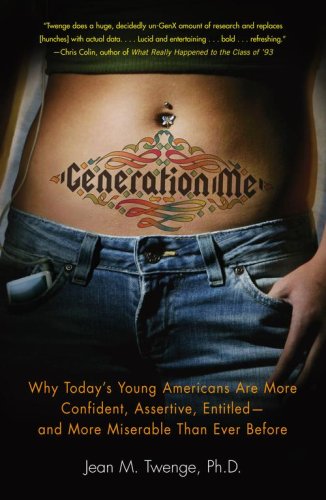All Nonfiction
- Bullying
- Books
- Academic
- Author Interviews
- Celebrity interviews
- College Articles
- College Essays
- Educator of the Year
- Heroes
- Interviews
- Memoir
- Personal Experience
- Sports
- Travel & Culture
All Opinions
- Bullying
- Current Events / Politics
- Discrimination
- Drugs / Alcohol / Smoking
- Entertainment / Celebrities
- Environment
- Love / Relationships
- Movies / Music / TV
- Pop Culture / Trends
- School / College
- Social Issues / Civics
- Spirituality / Religion
- Sports / Hobbies
All Hot Topics
- Bullying
- Community Service
- Environment
- Health
- Letters to the Editor
- Pride & Prejudice
- What Matters
- Back
Summer Guide
- Program Links
- Program Reviews
- Back
College Guide
- College Links
- College Reviews
- College Essays
- College Articles
- Back
Generation Me
In Generation Me, Dr. Jean Twenge, author of Narcissism Episode, writes about distinct characteristics between the Baby Boomers and of their children whom she defines as Generation Me. Generation Me consists of the group of people raised during the 1970s, 80s, and 90s that she describes as growing up in an era where they were taught consistently to place themselves above everything else that led to rapid growth of self-esteem. However these high levels of self-esteem during their childhood leaves a bittersweet after taste as adults when they realize the cold truth that they fall short of the expectations stipulated by the real world. Utilizing data from 1.3 million people over a time span of 60 years, Dr. Jean Twenge shows the shortcomings of Generation Me with the growth of self-esteem and individualism.
In her book, Dr. Jean Twenge addresses the 'fall of social rules and the rise of the individual' (Twenge 22) through different topics such as the prominence of 'the individualistic viewpoint, [while] concern with the opinions of others plummeted' (Twenge 22). Beginning with the Introduction, Twenge enlightens us on the meaning of Generation Me and her source of inspiration for the book. She continues to discuss the effects on American society by addressing different self-explanatory topics in different chapters. For example Chapter 1 named 'You don't need their approval' addresses the rise of individualism; Chapter 2 ' 'An Army of One: Me'; Chapter 6 ' 'Sex: Generation Prude Meets Generation Crude.' Twenge offers eye-opening statistics from surveys and
data collected over the years. For example in Chapter 6 she confronts the act of sex occurring at younger ages, and the growth of stds and AIDS. She supports her statements with statistics such as '27% of teens ages 13 to 16 have engaged in some type of intimate sexual activity'41% of 15 and 16-year olds, and 14% of 13 and 14-year olds' (Twenge 166). By including all these statistics Twenge effectively backs up her conclusions about the current status of Generation Me.
Twenge's writing style was mostly connected & lucid. Through out the book she added her own witty and humorous commentary in parenthesis. For example in the introduction she writes, 'During these projects, I probably pulled half a million journals off the shelves. ('I hope you're not allergic to dust,' my dissertation adviser quipped.)' (Twenge 13). In addition Twenge is able to incorporate her statistics and anecdotes in such a way that it doesn't disturb the flow of reading. However, sometimes when reading, the reader starts to notice the countless facts and numbers that can wear down the reader which leaves them wondering when there is going to be a sentence without a number. As a result for pages on Twenge would be talking about the same topic yet thoughtlessly throw in numbers to make it seem like new material. After reading and pondering the message of Generation Me, I have to agree with some of her ideas. Yet sometimes some of the things that she writes left me feeling that she was exaggerating, and make me question her credibility. Also the book seemed pessimistic because it critiqued almost every aspect of our lifestyle and culture. However it is an interesting read that is sure to leave the reader questioning the ideals of their current society.
Similar Articles
JOIN THE DISCUSSION
This article has 0 comments.

